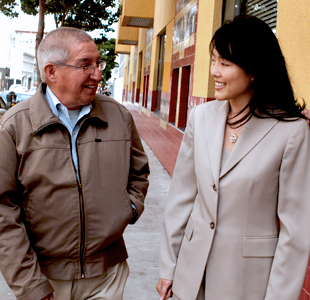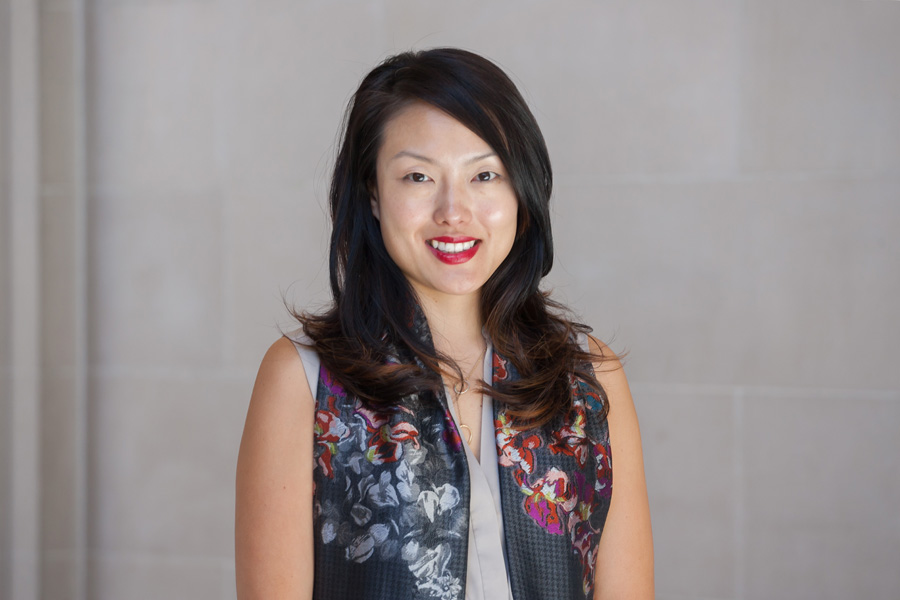- California Assembly OKs highest minimum wage in nation
- S. Korea unveils first graphic cigarette warnings
- US joins with South Korea, Japan in bid to deter North Korea
- LPGA golfer Chun In-gee finally back in action
- S. Korea won’t be top seed in final World Cup qualification round
- US men’s soccer misses 2nd straight Olympics
- US back on track in qualifying with 4-0 win over Guatemala
- High-intensity workout injuries spawn cottage industry
- CDC expands range of Zika mosquitoes into parts of Northeast
- Who knew? ‘The Walking Dead’ is helping families connect
Interview: SF’s first Korean American elected official aims higher to Sacramento
By Tae Hong
Jane Kim made headlines when she became the first-ever Korean American elected to public office in San Francisco.
That was five years ago — overseeing an eclectic district that includes the Tenderloin, South of Market, Civic Center, South Beach and Treasure Island, she’s since led policies on affordable housing and tenants rights, on raising the minimum wage, and been a trailblazer in a city known for its progressive stance.

“People [in San Francisco] are willing to embrace different ideas and are able to demonstrate to the rest of the country that we can make it work,” Janr Kim said. “We’re a model for other cities.” (janekim.org photo)
And last month, she threw in her name for the termed-out District 11 seat in the California State Senate to represent the city and northern San Mateo County.
For Kim, the race means more than a step up on the legislative ladder — she’s more aware than anyone what she represents: her city (of course), Asian Americans (she’s a second-generation Korean American) and women (of whom the California Senate is lacking, with a 25 percent representation and the coming term-outs of a handful from that estimate).
Kim grew up in New York City as the daughter to two South Korean immigrants, and as a witness to her parents’ experiences, she found awareness of societal inequities at a young age and, more importantly, began wanting to do something about it.
When she was 14 she began volunteering, and later working, with a group seeking solutions for the homeless.
More than two decades later, Kim’s focus hasn’t wavered, because from education to housing to battling homelessness, she’s all about how to help residents find equality in options and opportunities.
“I always wanted to be a part of building more equity,” she said. “A key piece of that, of course, is housing. Everyone should be housed.”
No one has to remind Kim just how notorious San Francisco has become for its through-the-roof housing prices. City residents working 40 hours a week, many of them more, on minimum wage should be able to secure a place to live, she said. It’s not a matter of whether or not people have jobs — it’s a matter of why the city is unable to offer a wider range of housing prices and options.
Kim’s passion for affordable housing began during her days as a community organizer, and it’s the tools and experiences and insight she gained there that she still uses, she said.
Then there is her relationship with the local Korean American community.
“I’ve always gotten tremendous support from the Korean community, have always since I ran for school board in 2004,” Kim said. “I didn’t run for office to present one community. I represent an entire city, and the people who have gotten me into office have been the tenants, the Chinese American community, the African American community. But I think it’s important as a Korean American to do that, to be able to demonstrate that as a Korean American.”
It’s especially important when she remembers the impact she herself now wields with young Asian Americans, especially as an increasing number of them turn to non-”traditional” fields outside of law and medicine.
Kim recalled a time during her second year in office, when a young Chinese high school student approached her to confide Kim was her role model.
“My parents see you on TV all the time,” the student told Kim, who’d never imagined Asian immigrants pushing their children into a wider spectrum of career options. “They told me that they want me to be like you.”
Kim said she finds it strange to find herself a role model, or what her younger self would have equated with a source of stress and pressure. But she also understands it as a honorable necessity.
“I think when you see role modelling, people start to view that as a possibility. We need more Asian Americans to go into public service,” she said. “I think that’s absolutely vital to the conversation in this country, and if I can be a part of that, that’s great.”
San Francisco, in particular, is the rare example of a major U.S. city led by a significant number of Asian Americans, from its mayor to its two assemblymen to four members of its Board of Supervisors.
The Big Apple may be her hometown, but Kim’s passion is San Francisco, which she calls a “laboratory” for experimental and cutting-edge legislation.
It’s a smaller city — about 840,000 to New York City’s 8 million — which makes it a breeding ground for forward-thinking policies that in turn inspire other regions to follow, she said, pointing to the city’s push for higher minimum wage and its championing of paid sick days become adopted and discussed across the country.
“People [in San Francisco] are willing to embrace different ideas and are able to demonstrate to the rest of the country that we can make it work,” Kim said. “We’re a model for other cities.”
That sort of result-oriented work is the primary lure of Sacramento for Kim, who sees California as an even bigger model for the rest of the country. She’s convinced lawmakers at the state level, not those in Congress, are doing the most exciting legislative work in the country.
“There’s so much gridlock in Washington, D.C.,” she said. “California is one of the world’s largest economies. We can make a huge impact if we’re able to demonstrate that certain types of laws work here.”
Nine years ago, when Kim was running for the Board of Education, someone asked her — if you are elected, what accomplishment would make you think, ‘I did a good job’ at the end of your term?
Kim’s answer then was to see that more kids were graduating after her term.
Her goals haven’t steered too far — her ambitions for a Senate term include returning funding to higher education, if possible even a free city college education and finding tools and support to combat increasing family homelessness.
The odds were stacked against her when she ran — without endorsement or institutional support — in 2010, and though she’s now got a demonstrative record spanning nine years (including her years on the Board of Education), the new campaign is another new territory for the progressive Democrat.
Her opponent, fellow Supervisor Scott Wiener, is a Democrat who has already received the support of incumbent Sen. Mark Leno.
Kim’s Fifty-Nine Precinct campaign strategy back in 2010 — an effort that brought her directly to voters — won her the supervisor seat.
Outreach and advocacy for her visions and policy beliefs are still at the center of the campaign for her Senate bid.
“It’s one thing to write laws, which is such an honor to be able to do, but it’s another thing to get people on board with it. I want them to support the work I’m doing,” Kim said. “I want them to believe in it and believe that it’s the right direction.”

















Pingback: Electrician Job Board South Korea | emergency electrician